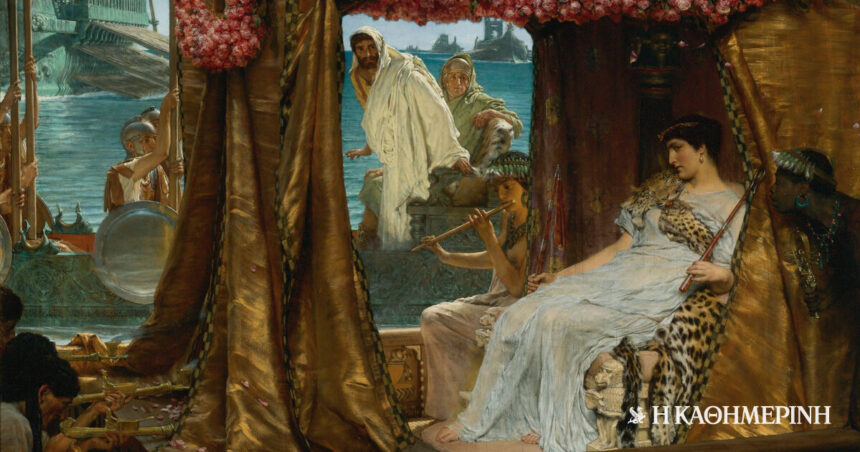To this day, the reasons why Mark Antony formalized his relationship with the queen of the Ptolemaic Kingdom, Cleopatra VII, remain unknown to the community of historians. Possibly he saw himself as a ruler of the East, continuing the tradition of the Greek rulers of the Hellenistic kingdoms. Cleopatra was the link to achieve this goal. On the other hand, his bond with the Ptolemaic queen displeased his erstwhile ally Octavian, who attempted to appear as a successor to the work of his adoptive father Julius Caesar, bearing the title “Imperator Caesar divi filius” (general Caesar, son god). The collision of the two men was inevitable.
Mark Antony was born on January 14, 84 BC. He belonged to one of the aristocratic families of Rome, which claimed descent from the demigod Heracles. Both his grandfather and his father had previously held high offices in the Roman Republic, those of pontiff and praetor. He himself had served as treasurer to his distant relative Julius Caesar, with whom he developed a close friendship. In 47 BC took over the government of Italy while Caesar was away on campaign in the East. He even received the office of bishop, although he had not previously become a praetor. After Caesar’s assassination, Mark Antony attempted to negotiate a compromise with his murderers and claim the role of heir to the Roman general.
However, the nineteen-year-old grandson of Caesar’s sister and his stepson, Gaius Octavius, tried to usurp the same role. Having acquired according to Roman custom the name of his stepfather, he used it to assert himself in the political circles of Rome. While Mark Antony made efforts to appease the spirits within Rome, Octavian projected the image of the dead Caesar, thus removing those who considered the Republic threatened. The two men decided in 43 BC. to join forces against their common enemies. Together with Lepidus, they formed the second “Triandria for the restoration of order in the state”. In 42 BC Caesar’s assassins were defeated at the battle of Philippi.
After his victory at Philippi, Mark Antony set out to restore Rome’s control in the East. There he met the queen of Ptolemaic Egypt, Cleopatra VII. Cleopatra had previously been the mistress of Julius Caesar, with whom she had a son, Caesarion. Dazzled by the beauty of the Macedonian queen, Antony immediately made her his mistress. In 40 BC Cleopatra gave birth to twins, Alexander-Helios and Cleopatra-Moon, fruits of her love with Mark Antony. Four years later, she gave birth to Ptolemy Philadelphus.
Mark Antony’s relationship with Cleopatra created many problems. The main thing was that Antonius had married in 40 BC. Octavian’s sister and had two daughters with her. He did not treat his wife well and sent her back to Italy in 35 BC. His later actions further complicated his position vis-à-vis Octavian’s ally. In 34 BC triumphed in Alexandria and ordered a total reorganization of the East, which he had undertaken to rule himself. Antony handed over to Cleopatra control of territories that had previously belonged to the Ptolemaic Kingdom, gave titles to his children with her, while Caesarion was given the title of Cleopatra’s co-regent. It appeared to Antony’s political opponents that he was attempting to establish a new dynasty in the East.
Undoubtedly, Octavian’s side exaggerated the magnitude of Mark Antony’s offense after the latter’s defeat. However, the fact remains that Antony did not benefit from his relationship with Cleopatra in the eyes of Roman public opinion. Mark Antony was defeated in the naval battle of Actium. in 31 BC. by the forces of Octavian. When the young Caesar’s troops were outside Alexandria, he committed suicide. Cleopatra followed his example a little later.
Column editor: Myrto Katsigera, Vassilis Minakakis, Antigoni-Despina Poimenidou, Athanasios Syroplakis








